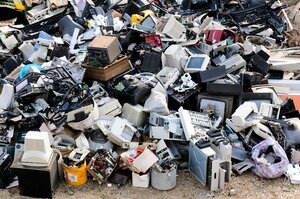More from Lumberjack Hauling & Junk Removal
More in Politics
Related Blogs
أرشيف
حصة الاجتماعي
How Can I Dispose of E-Waste Removal in San Dimas, CA Safely?
الجسم
Tucked into the foothills of the San Gabriel Valley, this bustling city has a great blend of amenities, parks and open spaces, events, quiet residential neighborhoods, and one of the county’s first water parks. It also offers a variety of e-waste removal in San Dimas, CA.
Residents should avoid putting non-recyclable paper into their recycling pick-up services or green waste carts. This can pollute the environment and pose health hazards.
Recycling
The best way to recycle e-waste is to send it to a certified electronics recycling facility. This will ensure that the devices are manufactured and recycled properly. It will also reduce the amount of e-waste that ends up in landfills, which can cause health problems. The toxins found in landfills can leach into the groundwater and pose a threat to human health.
Residents should avoid putting non-recyclable items in their recycling pick-up services or green waste carts. These materials can contaminate the bin and lead to it being sent to landfills. It is also important to use reusable products, such as coffee cups and reusable plastic bags. In addition, residents should avoid putting food residue in their recycling bins. Food scraps should be placed in the organics cart to be converted into methane gas or compost.
Most localities have mandatory e-waste removal in San Dimas, CA, that require manufacturers to help with the disposal of their electronic products. These programs are usually run by state governments, although some communities also have voluntary e-waste recycling programs. These programs can be very successful and are a great way to reduce e-waste.
The numbers that appear on most plastic products are known as resin identification codes (RIC), and they are used to identify the type of plastic used in an item. However, RICs should be understood to be only a tool for identification and do not necessarily indicate that an item is recyclable. For example, code 1 plastics are often recyclable, such as PET polyethylene terephthalate (drink bottle plastic), but some code 2 plastics, such as HDPE high-density polyethylene (milk and juice jug plastic), may not be.
Incineration
Before the days of regular trash service, a major portion of household waste was burned in small concrete, cinder block, or brick backyard incinerators. In fact, some people still have those charred relics from Southern California’s smoggy past. While these old incinerators were a convenient way to dispose of sewage and garbage, they often polluted the environment with smoke, toxic gases, and ash.
Today, the state of California has stringent e-waste removal in San Dimas, CA, with substantial fines for non-compliance. In addition, the state’s Universal Waste Rule bans most consumer electronics from landfills. These items include computer monitors, televisions, VCRs, stereos, fax machines, and cellular telephones. The best way to dispose of these items is to take them to a free countywide household hazardous waste and e-waste roundup.
These roundups are typically held at local parks or fire stations and are a convenient way to get rid of hazardous products like paint and pesticide cans, used batteries, and electronic equipment that can no longer be reused or refurbished. However, it is important to bring the items in their original, labeled containers.
The e-waste is incinerated on-site or at an off-site facility. During this process, the toxins are converted to carbon dioxide and air pollutants, as well as fly ash and other solid residues. Waste incineration adds to the air pollution problem and disproportionately affects disadvantaged communities and areas with high populations of minorities.
Drop-Off Centers
E-waste contains dangerous materials that can harm humans and pollute the environment. However, it is possible to dispose of these products safely by dropping them off at local recycling centers. These facilities are regulated by the state and must comply with strict rules regarding e-waste disposal. This includes locking devices, preventing data theft, and reducing the amount of e-waste that is sent to landfills.
In addition to storing hazardous waste, some of these centers also recycle household items such as plastic bottles, paper products, and batteries. They also accept paints, varnishes, glues, and pesticides. You can find out more information by visiting the website of your local recycling center.
You can also recycle your e-waste at Household Hazardous Waste Roundups, which are hosted by the Sanitation Districts of Los Angeles County. These events are open to the public and free of charge. You can find a list of acceptable items on the LACSD website.
One of the biggest mistakes people make when trying to recycle is putting non-recyclable materials into their recycling pick-up services in San Dimas, CA, and green waste carts. For example, putting paper in your bin can contaminate the entire batch and send it to landfills. You can avoid this by bringing your own reusable materials to the store, such as a reusable coffee cup and wooden stirrer.
Selling Old Furniture
Whether it's grandma's antique armoire or the barcalounger your girlfriend deemed an eyesore, reselling old furniture can be profitable—aand more eco-friendly than tossing it in the dumpster. The key is to choose pieces that still have some value and are in good condition. That said, it's not a great idea to try to resell that beat-up mattress or sprung-cushion sofa unless you want to pay a Junk Removal in San Dimas, CA to dispose of it for you.
Selling your old furniture is easier than you might think. You can post it on websites like Craigslist and eBay, or check local listings. Many furniture stores will also buy your used items. In addition, you can find online marketplaces that are geared toward used furniture, such as Chairish.
Another option is to donate your items to a charity. This is a great way to avoid paying for a junk removal company and help people in need. Just be sure to get a receipt from the charity to claim your tax deductions.
The state of California has stringent e-waste removal in San Dimas, CA, and significant fines for businesses that do not comply. These laws include the Universal Waste Rule, which prohibits companies from shipping cathode ray tubes (CRT glass) and other covered electronic waste to foreign countries for processing or recycling unless they first try to find a covered in-state recycler.









تعليقات